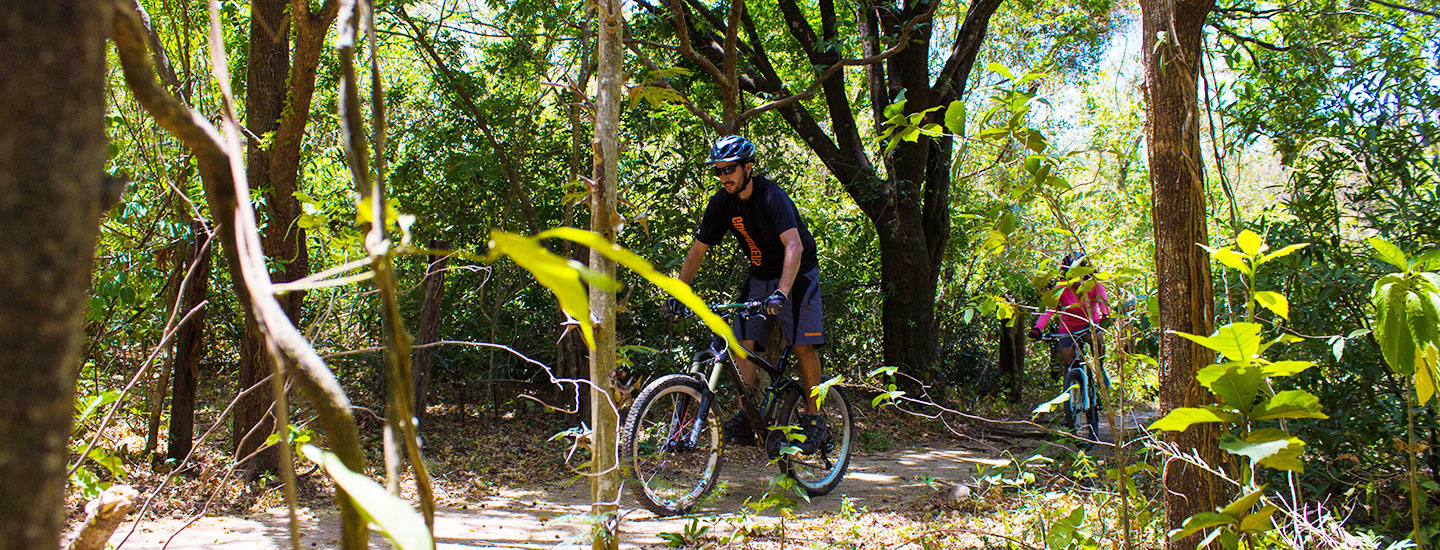
Biking in
Costa Rica
Biking in Costa Rica
Countless miles of trails covering every type of terrain await biking enthusiasts of all levels. There are a variety of day tours in the outskirts of San Jose around Irazu and Poas volcanoes or the Orosi Valley. The mountains of Talamanca or the Central Volcanic Mountain Range offer more rigorous biking.
The mountain ranges in Guanacaste and Tilaran, as well as the valleys and plains along the Caribbean, the Central Pacific, and the Southern Pacific also make for excellent biking destinations. There are an estimated 80 paths to choose from. In 2015, more than 400,000 cyclists toured the country, a number that continues to grow along with the sport’s popularity.
Enthusiasm for cycling has led to numerous international events including the National Cup and the National Championship, the Panamerican Championship, the Mountain Biking National Championship, the Sun Route (la Ruta del Sol), the Endurance Cup, the Volcano Challenge (in the Central Valley and Arenal volcanoes), the Conquerors’ Route (Puntarenas to Limon), the International Tour in Costa Rica, and the Female Tour, which was created just a few years back.
A favorite place for mountain biking, Turrialba in Cartago, has various fascinating archeological sites and can be reached by the Caribbean coast. The terrain ranges from moderate to extreme.
High altitude challenge. The Cerro de la Muerte (Death’s Peak) is the highest peak along the Interamericana Highway at 11,300 ft. It is part of La Amistad Pacific Conservation Area and its high plateau descends towards the coastal beaches. Rainforest surrounds the Arenal Volcano, with difficult ascents and descents throughout the territory.
Wildlife. In Sarapiqui, Heredia, there are gravel roads and terrain that wind through remote communities. Howler monkeys, iguanas, insects, butterflies, and all types of birds inhabit this rainforest. Its difficulty is intermediate, with flat terrain, dunes and hills.
Toward the ocean. The spectacular Piedras Blancas National Park is a wildlife refuge extending from Puntarenas, in Golfito, to the southeast in the Osa Peninsula. It is home to the only lowland rainforest in the tropical Dulce Gulf that remains green year-round.
For your safety:
- This activity, like any other, requires a certain amount of experience, adequate equipment, and careful planning of the places to explore.
- Mountain biking is designed especially for experiencing and conquering difficult terrain. It generally requires front-fork suspension and rear-end suspension is becoming more and more common. Essential accessories include knee pads, shin pads, elbow pads, gloves, and helmet. It is recommended to wear light and synthetic clothes, as well as appropriate socks and to bring adequate fluids.
- Before heading out, bikes should be completely checked and ready, including the condition of the chain, gears, tire pressure, brakes and brake pads. A tool kit is a must.
- We encourage safe road rules: distance from vehicles, defensively riding and cautious descents. The rainy months still provide attractions for biking, but caution is encouraged.
- We recommend traveling in groups with a guide with the advantage that he/she can monitor the physical condition of every person and provide directions along the route.
Costa Rica's best places for biking
On the map you'll find Costa Rica's tourism regions, where you can participate in these activities. For more information on any of these activities, contact your travel agent or hotel.
